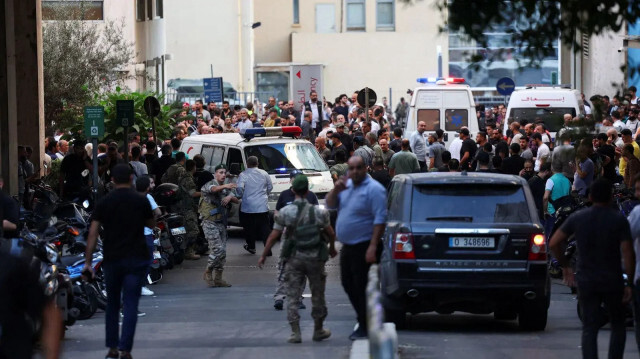
Israel's original plan was to explode devices only in event of full-scale war with Hezbollah, but when plan was compromised, it was done early, killing and injuring thousands, says report
Israel launched Tuesday's deadly pager attack on Hezbollah earlier than planned in response to intelligence indicating that two members of the Lebanese group had become aware that their devices were compromised, according to a media report.
According to high-level regional intelligence sources, the decision to proceed with the operation early was "forced" by this intelligence lapse, said Al-Monitor online.
The intelligence sources said there had been intense discussions within the Israeli security establishment in the days leading up to the surprise attack, which killed nine people and injured thousands of others, including a 10-year-old girl.
They revealed that thousands of pagers, recently acquired by Hezbollah, had been rigged with explosives by Israel before being delivered to the group.
While the sources did not clarify whether Israel produced or shipped them to Hezbollah directly, they confirmed that Israeli intelligence had infiltrated them, Al-Monitor said.
"They could be controlled from Tel Aviv," one source noted.
The Israeli military's original plan was to explode the devices in the event of a full-blown war with Hezbollah in order to gain a strategic edge, the sources added, referring to escalating hostilities between Israel and the Lebanese group across the countries' shared border.
"Yet suspicions from at least two Hezbollah members caused the Israeli security establishment to agree to a premature execution of the plan.”
- Accelerated schedule as plan was compromised
A Hezbollah member in Lebanon was killed after expressing suspicions about foul play involving the pagers several days ago, sources said, according to Al-Monitor.
"According to the sources, days later, another Hezbollah member suspected that the devices were compromised and planned to alert his superiors, Israeli intelligence learned."
"The sources said that Israel's intelligence apparatus weighed three options,” said the outlet: Go to war with Hezbollah and detonate the pagers as originally planned, detonate them immediately ahead of a war and do as much damage as possible to Hezbollah personnel, or ignore the plan being compromised and risk it being discovered.
The second option was ultimately carried out in an operation that was kept confidential, even from Israel's ally the US.
"Al-Monitor's sources emphasized that this was not the original plan nor was it the Israeli government's preferred course of action, opting instead to save such an operation for a full-blown conflict with Hezbollah, which boasts more than 150,000 projectiles in its arsenal, according to Western intelligence assessments."
Online outlet Axios also reported that Israel chose to detonate the pager devices used by Hezbollah members in Lebanon and Syria due to concerns that the group might have uncovered its covert operation, according to three US officials.
"It was a use it or lose it moment," one US official said, explaining the reason Israel provided to the US for the timing of the attack, according to Axios.
On Tuesday, at least nine people, including a child, were killed in a mass explosion of pager communication devices in areas across Lebanon, according to Lebanese Health Minister Firas Al-Abiad.
Hezbollah confirmed that at least two members were killed and many injured in the mass explosion and held Israel fully responsible for the incident, vowing “just retaliation from unexpected quarters” to Israel.
The mass explosion of pagers came amid an exchange of cross-border attacks between Hezbollah and Israel against the backdrop of Israel's relentless offensive on the Gaza Strip, which has killed more than 41,000 people, mostly women and children, following a Hamas attack last October.

